J B Williams' Journey -
The Coast of Chile
"Tuesday, 30th October, 1883 Got up a little before six and found that we were in the narrows. The cliffs rise near perpendicular from the water's edge and a plenty of snow on top. It seems nothing but bare rocks, nothing growing, only a little heather. We have not seen any Patagonians as yet, but have seen the smoke of their fires in the distance... We have passed the narrowest part and it is getting wider fast. I went below to see the stoke hole and then went back through the engine room and went through the tunnel to see the shaft of the propellor. It is a fine lot of machinery."
They got through the straits about 1 o'clock and met the open water again, and rougher weather with it.
"...am getting to feel sick. I threw up all my dinner and could not eat anything more for the night..."
It was rougher still next day. J.B.W. got up at 5.30 and took coffee to the boys, but it was wasted labour as they were mostly sick. The next night was even worse, with "things falling about all night", but in the morning they could see land in the distance.
"...The Chief Officer shot a large bird called the Albatross, but it fell in the sea..."
Obviously neither the Chief Officer nor J.B.W. were devotees of Coleridge and his 'Rime of the Ancient Mariner' because the Chief shot another next day.
Friday, 2nd November, was remarkable for the fact that J.B.W. didn't get up until nearly 8am - the latest he records:
"as I was very comfortable in bed." Seasickness appears to have taken its toll. His work with the cattle and poultry had apparently ceased, or been reduced to a minimum. From now on the boat would be calling frequently at ports and the weather was cold so that meat could be stored for a while. The ship was a couple of days behind schedule due to the rough weather, but that improved as they sailed up the Chilean coast and passed scores of whales, blowing water. The seamen who had been injured were now able to get on deck again, with the exception of the boatswain's mate, whose leg had been broken.
"Sunday, 4th November, 1883. Got up about 7am and found we were close to the shore at Lota. Had breakfast and all of us Cornish boys, except Charlie, went ashore. Lota is a small seaport. All the houses are built of mud, wood or brick and are only one storey high. The people are very dark brown, with jet black hair, and rather below medium height. The streets are very uneven and covered in sand, which makes it bad for walking."
They took a walk out over the hills and J.B.W. noted that there were few trees, but the hills were covered in green, with small shrubs here and there, and that there was a lot of lowland, covered in water.
"...the birds are singing lovely, just like they do at home in April or May. The shops are small, funny looking little places. The dwelling places have no chimneys, but they have their fires in the middle of their houses, with the smoke coming out of their doorways. There are some nice flowers here in some of the gardens, and a lot of mignonette, like that of home. We stayed on shore until about 5pm... and then returned. After supper I went on the main deck with the orguinette and had a nice time of music and singing, and then came down to the steerage and played again. Did not go to sleep until about 11pm."
Forty miles on the ship stopped again, at Talcahuano, and J.B.W. gave another of his minute by minute commentaries, including an account of a small boat which brought some friends of one of the first class passengers for a few minutes' meeting before the ship left again. He was also shown through the first class quarters by the steward, and admired the saloon bedrooms and baths.
"...It is like a palace, the painting is lovely, and railing of silver which has to be kept bright. There must be a lot of work to keep it clean and nice. All the stewards are very kind to me and willing to show me anything and do anything for me."
The following day they called at Valparaiso, which J.B.W. admired very much. They went ashore, rode in a street car, and JBW bought "a nice looking pair of boots for 9 shillings."
"...Scoble has left us. We went with him and found his brother. Have not seen him since... After we were in bed some time, some of the sailors came back from shore, drunk, and commenced fighting. How dreadful it is for men to be quarrelling with each other when maddened by drink. Some drew knives, but no-one was seriously injured."
Next morning, 7th November, he rose early to watch the cargo being discharged.
"What splendid appliances they have for hoisting heavy weights. It is a splendid dock. I saw them hoist the bullocks with their boxes and drop them in barges alongside."
There was a spin-off from his cattle tending, as the man who owned the bullocks he had been looking after invited him to a meal and:
"....we went together to a first class restaurant and had a splendid breakfast, for which he paid two dollars."
He had another tram car trip, from end to end of the city, and caught a glimpse of Scoble and his brother. Another couple of Cornishmen left to catch a coastal boat. The ship was still discharging cargo next day and, considering that this was over a century ago, by a system of hydraulic lifts, straight into trucks waiting along the wharf.
"...Four or five of the men went on shore yesterday without leave and stayed all night, and when they came on board in the morning they were drunk and soon got their discharge. I hear some of them have joined the Chilean Navy.
Friday, Nov.9th, 1883 ... An English Man of War just came in harbour. She fired 21 shots and then the port replied. She then fired 11 again and a little after fired 3. She is a fine ship, painted white outside. We went on shore and got our tickets to go to Tocopilla by the Ohee boat as this one don't call there. We came on board about five. Went to bed 8pm."
Next morning they left the Galicia and boarded the coastal boat, Lautaro.
"...We have to sleep on deck without any beds to lay on. This seems to be a nice boat. We can walk from one end to the other. There is a lot of sheep and bullocks. We have been on the hurricane deck. All the first class passengers are put there."
They were told that little food would be provided on the Lautaro and that the voyage would last seven or eight days so they contracted with the chief cook to supply them with all the food they wanted for 3 dollars each.
With no proper bed to sleep on he was up "before break of day" next morning and found they were anchored outside Los Villos where they took on board a boatload of wheat. By this time J.B.W. had fraternised with the Quartermaster.
"...I had some coffee about 5am, beefsteak breakfast about 8am with the Qr.Master. We had a good night's rest. Treweek, Bennett and myself had one of the saloon bedrooms, which was a contrast from the ship's deck.
We have scores of bullocks, hundreds of sheep and goats, geese and ducks in abundance, large baskets of eggs and vegetables. It is like a market house. The dealers are taking it up the coast for sale..."
There was plenty to see on the journey up the Chilean coast, and J.B.W. noted the size of each place, the terrain, indications of industry and major buildings, counted the trains which ran in and out of the towns and recorded many of the vessels in each harbour, which frequently seemed to include "an English Man of War".
"At Tongoy Ð... several people came on board selling shirts, flannels, drawers, etc...
Tuesday, No.13th, 1883 Got up about 6am and discovered to my astonishment that someone had broken open my bag during the night and took my best suit of clothes, John Prout's new suit except the pants and some shirts. Can't tell exactly what is gone. The chief officer and engineer made a search, but in vain. Can't find any clue to them anywhere..." John Prout, his brother-in-law, had been living in South America for many years.
At Sarco "the smallest and most unlikely place for a boat of this size that I ever saw" the sea was so rough that no boat could come out to them and they had to anchor outside all night. At Pena Blanca "... a few houses on a sandy plain at the foot of a mountain" he could not imagine what the natives did for a living. A man from Wendron, a miner with a broken leg, came on board on his way to Huasco, where J.B.W. noted the stacks of the copper smelting works.
Cornishmen were everywhere. At Caldera "a young man, a native of Carharrack, left with his wife." Her parents kept a hotel in the town. At Antofagasta, which they reached on 17th November, he noted the many headstones in the cemetery at the foot of the mountain.
"...we have been anchored here all day, as idle as a painted ship upon a painted ocean... There is a silver smelting works and foundry here, but trade is rather dull at present... Just outside the cemetery there are some stones. The chief officer told us it is a mark where 5 or 6 soldiers were shot for deserting from the Chilean army during the late war..."
Cobija, their next port, had been destroyed in May 1870 by a tidal wave. J.B.W. could see the ruins of houses poking through the rubble which slid down from the mountain. Altogether it must have seemed a country where death was ever close.
They anchored at Tocopilla at 1pm on Sunday, 18th November. "... and were soon surrounded by boats, and a lot of Cornish boys came on board to welcome us. It made us feel like home. We soon made acquaintance with several boys from home around. We are putting up to a hotel kept by a Cornish man. We got there about 2pm. Mr Bennetts was very kind in showing me about the place. I like the place pretty well considering.
After we got through we saw a young man named Peters who invited us to go to the meeting house. He wanted me or Charlie to preach. I enjoyed myself first rate. There were 30 present, including 3 females. There was a gentleman named Tredinick who came to me and spoke very kindly and told me to call at his office tomorrow at 9 or 10am and he would see what he could do for us..."
Next chapter - In Tocapilla, ChileSo ended his first day in Tocopilla.
Top of page- Home Page
- Family and Background
- Mary Ann's Father
- Her Mother
- Her Home
- A Soul To Be Saved
- Her return to Cornwall and her marriage
- JBW - Leaving Europe
- Arriving in South America
- In Tocapilla, Chile
- Over the Andes to Bolivia
- Working the Tatasi Mine
- Working the Porco Mine
- Homeward through Argentina

Chile
Alan Taylor
for more information or copies of the book
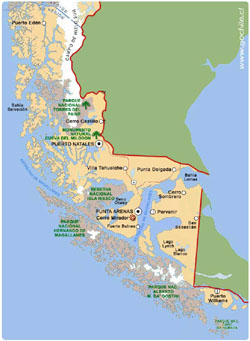
Patagonia South
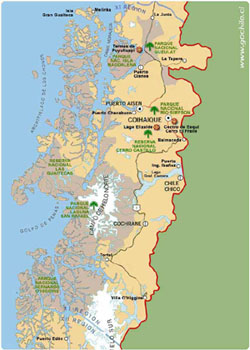
Patagonia North
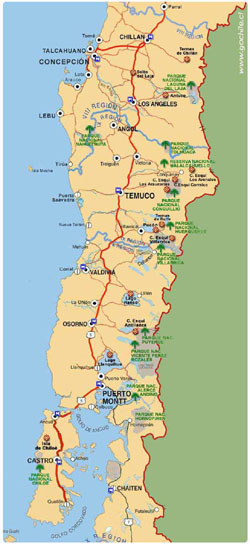
South Central Chile
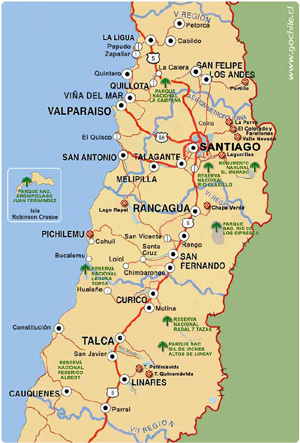
Central Chile
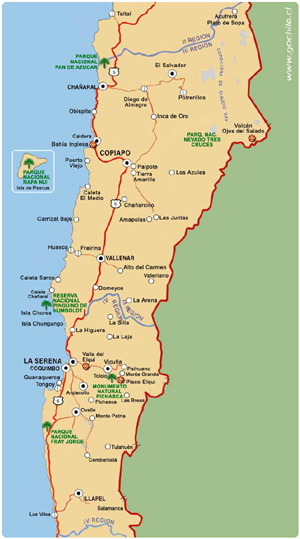
North-Central Chile

North Chile
2nd July 2004